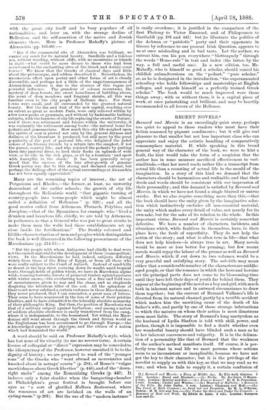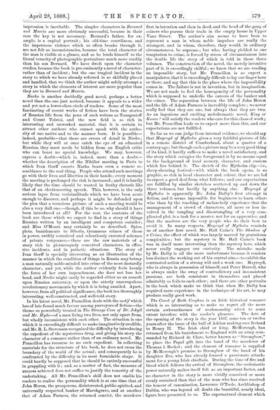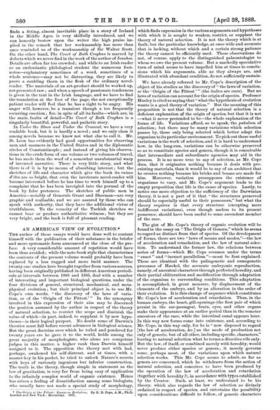RECENT NOVELS.* Bernard and Marcia is an exceedingly quiet story,
perhaps too quiet to appeal to those readers who must have their fiction seasoned by piquant condiments ; but it will give real pleasure to that smaller but not less important class who can appreciate and enjoy the artistic handling of comparatively commonplace material. If, while speaking in this broad general way of the character of the book, we were to hint a fault, the hint would take the form of a suspicion that the author has in some measure sacrificed effectiveness to veri- similitude,—that her novel reads rather like a transcript from actual life than a recasting of actual life in the mould of the imagination. In a story of this kind we demand that the characters should be harmonious and realisable, and that their deeds and words should be consistent with our impression of their personality ; and this demand is satisfied by Bernard and Marcia, in which we have not found a single blurred or untrue stroke. But we also require something more than this,—that the book should have the unity given by the imaginative selec- tion which instinctively excludes all non-essential material, the unity which makes every detail of value, not merely for its own sake, but for the sake of its relation to the whole. In this important virtue, Bernard and Marcia is certainly somewhat defective. We have a number of characters, incidents, and situations which, while faultless in themselves, have, in their place here, the fault of superfluity. They do not help the action of the story; and what is often true in life—that what does not help hinders—is always true in art. Many novels would be more or less better for pruning; but few recent novels would repay the labour of the pruner so well as Bernard and Marcia, which, if cut down to two volumes, would be a very graceful and satisfying story. The sub-title may mean either that a considerable number of the characters are middle- aged people, or that the romance in which the hero and heroine act the principal parts does not come to its blossoming-time until they have left their days of youth far behind them. They appear at the beginning of the novel as ahoy and girl, with much both in inherent nature and in outward circumstance to draw them together ; but the current of Bernard Vallance's life is diverted from its natural channel, partly by a terrible accident which makes him the unwitting cause of the death of his father's wife, and partly by one of those strange infatuations to which the natures on whom their action is most disastrous seem most liable. The story of Bernard's long martyrdom as the husband of Lydia Shafton is told with skill, power, and pathos, though it is impossible to feel a doubt whether even her wonderful beauty should have blinded such a man as he to her inherent coarseness and vulgarity. It is in the delinea- tion of a personality like that of Bernard that the weakness of the author's method manifests itself. Of course, it is per- fectly true that in real life we meet persons whose "actions seem to us inconsistent or inexplicable, because we have not got the key to their character; but it is the privilege of the novelist to supply us with this key, so that we may read as we run ; and when he fails to supply it, a certain confusion of (1.) Bernard and Marcia a Story of Middle Age. By Buis %both Glaister. 3 vols. London: Hurst and Blaokett.—(2.) Narka. By Kathleen 0 Means. 2, vols. London: Bentley and Son.—(3.) King or Knave? By B. E. Francillon. 3 vols. London: Ghetto and Windns.---(4.) .Mayropd of Mitholm a Romance of the Fella By John Dalby. 3 vols. Leaden: Chapman and HalL—(5.) The Court of Rath Croghan ; or, Dead but not Forgotten. By M. L. O'Byrne. Dublin M. H. Gill and Son.—(6.) Under the Stars and Under the Crescent a Romance of Bast and West. By Edwin de Leon. 2 vols. London: Sampson Low and Co. impression is inevitable. The simpler characters in Bernard and Marcia are more obviously successful, because in their case the key is not necessary. Bernard's father, for ex- ample, is a capital portrait ; his old-time courtliness, and the impetuous violence which so often breaks through it, are not felt as inconsistencies, because the total character of the man is visible at a glance, and so he lends himself to the literal veracity of photographic portraiture much more readily than his son Bernard. We have dwelt upon the character studies, because the book is pre-eminently a novel of character- rather than of incident; but the one tragical incident in the story to which we have already referred is so skilfully placed and handled, that we think the author might safely attempt a story in which the elements of interest are more popular than they are in Bernard and Marcia.
Narka is another decidedly good novel, perhaps a better novel than the one just noticed, because it appeals to a wider and yet not a lower-class circle of readers. Some of the most fascinating of recent works of fiction have been the stories of Russian life from the pens of such writers as Tourgenieff and Count Tolstoi, and the new field is so rich in interesting and unworked material, that it is certain to attract other authors who cannot speak with the autho- rity of one native and to the manner born. It is possible— indeed, probable—that there are errors of detail in Narka ; but while they will at once catch the eye of an educated Russian, they must needs be hidden from an English critic who can boast no special knowledge. We may, however, express a doubt—which is, indeed, more than a doubt— whether the description of the Nihilist meeting in Paris to which Ivan Col-if escorts Narka bears even a remote re- semblance to the real thing. People who attend such meetings go with their lives and liberties in their hands ; every moment the meeting is prolonged the risk is increased ; and it is hardly likely that the time should be wasted in frothy rhetoric like that of an electioneering speech. This, however, is the only serious lapse from verisimilitude which we have been acute enough to discover, and perhaps it might be defended upon the plea that a veracious picture of such a meeting would be also a very dull one,—though, if this be so, why should it have been introduced at all For the rest, the contents of the book are those which we expect to find in a story of things Russian written by an intelligent and competent outsider; and Miss O'Meara may certainly be so described. Spies, plots, banishments to Siberia, tyrannous crimes of those in power, swiftly conceived and relentlessly executed schemes of private vengeance,—these are the raw materials of a story rich in picturesquely conceived characters, in effec- tive incidents, and in pathetic situations. The story of Ivan Gorff is specially interesting as an illustration of the manner in which the condition of things in Russia may betray a man naturally noble-minded into crime of the most dastardly character; and yet, while the author evidently feels keenly the force of her own impeachment, she does not lose her head, and Narka might easily be regarded either as an assault upon Russian autocracy, or upon the utterly unscrupulous revolutionary movements by which it is being assailed. Apart, however, from all political significance, the book is a thoroughly interesting, well-constructed, and well-told story.
In his latest novel, Mr. Francillon deals with the motif which has of late found much favour among purveyors of fiction—the theme so powerfully treated in The Strange Case of Dr. Jekyll and Mr. Hyde—of a man living two lives, not only apart from, but wholly inconsistent with each other. The situation is one which it is exceedingly difficult to make imaginatively credible, and Mr. R. L. Stevenson recognised the difficulty by introducing the expedient of the mysterious drug, and giving his story the character of a romance rather than of an ordinary novel. Mr. Francillon has recourse to no such expedient. In collecting materials for the structure of his book, he does not cross the boundary of the world of the actual ; and consequently he is confronted by the difficulty in its most formidable shape. It could hardly be supposed that he should be entirely successful in grappling with it ; and, as a matter of fact, the measure of success achieved does not suffice to justify the temerity of the undertaking. All Mr. Francillon's skill does not enable his readers to realise the personality which is at one time that of John Heron, the prosperous, disinterested, public-spirited, and universally respected banker of Marchgrave, and at another that of Adam Farness, the returned convict, the murderer first in intention and then in deed, and the head of the gang of coiners who pursue their trade in the empty house in Upper Vane Street. The author's aim seems to have been to represent a man in whom noble impulses are really the strongest, and in whom, therefore, they would, in ordinary circumstances, be supreme ; but who, having yielded to one temptation to crime, is forced by stress of circumstances into the double life the story of which is told in these three volumes. The construction of the novel, the merely inventive part of it, is exceedingly skilful ; we know that we are reading an impossible story, but Mr. Francillon is so expert a manipulator, that it is exceedingly difficult to lay our finger here or there, and say that this is the place where the impossibility comes in. The failure is not in invention, but in imagination. Weare not made to feel the homogeneity of the personality which is supposed to underlie the careers of the banker and the coiner. The separation between the life of John Heron and the life of Adam Furness is incredibly complete ; we never really feel that they are one, but always that they are two. Asan ingenious and exciting melodramatic novel, King or Knave ? will satisfy the readers who care for this class of work ; but Mr. Francillon leads us to expect more than this, and our expectations are not fulfilled.
So far as we can judge from internal evidence, we should say that Mayroye/ of Mytholm gives a very faithful picture of life in a remote district of Cumberland, about a quarter of a century ago; but though such a picture may be a very good thing of its kind, it hardly suffices to make a novel satisfactory, and the story which occupies the foreground is by no means equal. to the background of local scenery, character, and custom which lies behind it. The sketch of the Mytholm clip—i.e., sheep-shearing festival—with which the book opens, is so graphic, so rich in local character and colour, that we are led to expect a good deal from what follows; and our expectations are fulfilled by similar sketches scattered up and down the three volumes, but hardly by anything else. Mayroyd of Mytholm is apparently Mr. John Dalby's first attempt in fiction, and it seems impossible for beginners to learn other- wise than by the teaching of melancholy experience that the management of a crowd of characters, all more or less in- volved in the tangling and disentangling of a very com- plicated plot, is a task for a master, not for an apprentice, and that the masters are the very people who do their best to avoid it. In many respects, Hayroycl of Mytholm reminds us of another first novel, Mr. Hall Caine's The Shadow of a Crime, the effect of which was largely marred by gratuitous complexities ; but the mystery in Mr. Hall Caine's book was in itself more interesting than the mystery here, which never really engages our curiosity. The mistake made by Mr. Dalby is all the more unfortunate because it renders less distinct the working out of his central aim,—to exhibit the contrasted action of a strong will and a weak one. Mayroyd„ who is always in possession of himself, and Peter Burrell, who is always under the sway of contradictory and inconsistent passions, are both consistent in themselves and placed admirably as foils to each other ; and there are other portraits in the book which make us think that when Mr. Dalby has acquired more experience in the technique of his art, he may produce really good work.
The Court of Bath Croghan is an Irish historical romance which is so interesting as to make us regret all the more certain awkwardnesses of workmanship which to some extent interfere with the reader's pleasure. The date of the opening of the story is the year 1167, some ten or twelve years after the issue of the bull of Adrian making over Ireland to Henry II. The Irish chief or king, McMorough, has returned from his banishment to England with an army com- manded by Richard de Clare, better known as " Strongbow," to place the Papal gift into the hand of the murderer of Thomas h Becket ; and the element of romance is supplied by McMorough's promise to Strongbow of the hand of hie daughter Eva, who has already formed a passionate attach- ment for a young Irish chieftain. During the time of fire and blood which follows the arrival of Strongbow, the ecclesiastic power naturally makes itself felt as an important factor, and no character in the story is more vividly conceived or more evenly sustained than that of the Mall who has since received the honour of canonisation, Lawrence O'Toole, Archbishop of Dublin, who was beyond all doubt the beautiful, nearly ideal, figure here presented to us. The supernatural element which finds a fitting, almost inevitable place in a story of Ireland in the Middle Ages, is very skilfully introduced, and we can honestly bestow upon the writer the high praise im- plied in the remark that her workmanship has more than once reminded us of the workmanship of Sir Walter Scott. On the other hand, The Court of Rath Croghan is marred by defects which we never find in the work of the author of Ivanhoe. Details are often far too crowded; and while to an Irish reader or an enthusiastic philological student the numerous foot- notes—explanatory sometimes of a word, sometimes of a -whole sentence--may not be distracting, they are likely to prove a rankling thorn in the flesh of the ordinary novel- reader. The materials of an art-product should be worked up, not presented raw ; and when a speech of passionate tenderness is given in the text in the Irish language, and we have to find the translation at the foot of the page, the not exceptionally patient reader will feel that he has a right to be angry. His anger will, however, be a transient though a too frequently recurring emotion ; for, in spite of all its faults—which are, in the main, faults of detail—The Court of Rath Croghan is a singularly beautiful, powerful, and pathetic story.
In Under the Stars and Under the Crescent, we have a very readable book, but it is hardly a novel ; and we only class it among novels because we know not what else to call it. Mr. St. Leon has evidently had good opportunities for observing men and manners in the -United States and in the diplomatic circles of Constantinople ; and instead of giving his observa- tions in the crude form of one volume or two volumes of travel, he has made them the woof of a somewhat unsubstantial warp of invented narrative. There is very little story, and what there is of it is by no means of absorbing interest ; but the sketches of life and character which give the book its raison d'are are so bright, that even the inveterate novel-reader will become interested before he has time to work himself up to a complaint that he has been inveigled into the perusal of the book by false pretences. The sketches of public men in America—notably of Generals Grant and Sherman—are very graphic and realisable, and we are assured by those who can speak with authority, that they have the additional virtue of truthfulness. To the veracity of the Turkish sketches we cannot bear or produce authoritative witness ; but they are very bright, and the book is full of pleasant reading.




































 Previous page
Previous page